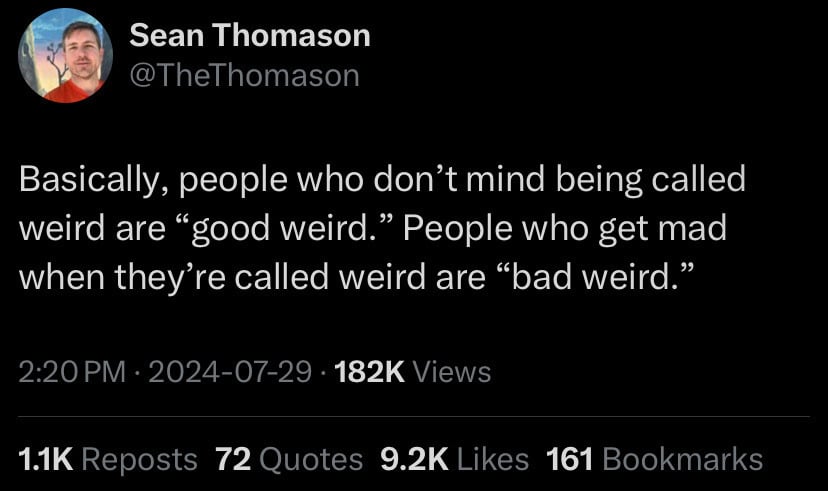this post was submitted on 01 Aug 2024
961 points (97.9% liked)
People Twitter
5623 readers
895 users here now
People tweeting stuff. We allow tweets from anyone.
RULES:
- Mark NSFW content.
- No doxxing people.
- Must be a pic of the tweet or similar. No direct links to the tweet.
- No bullying or international politcs
- Be excellent to each other.
- Provide an archived link to the tweet (or similar) being shown if it's a major figure or a politician.
founded 2 years ago
MODERATORS
you are viewing a single comment's thread
view the rest of the comments
view the rest of the comments

The people who see "weirdness" as being bad are the "bad weird."
The anime kid hates being bullied, but he doesn't see non-conformity as a negative. It's not the label of weird, but the negative sentiment behind it that hurts.
The white supremacist who sees diversity as an evil doesn't mind people saying he hates black people. What he hates (aside from minorities) is being identified as an "other" through the weird label.
Meta. I appreciate that last sentence.
It's a cultural node, social norm, expectation blah blah. What it comes down to is perception. We all belong to different groups. Many of these groups overlap. Sometimes we have niche interests that don't quite align with the others. As you draw circles intersecting circles and push people into these groups, the further a circle is from another, the more likely there will be a form of conflict.
This perception is linked to expectation through a lack of understanding. In some cases all of this is caused by fear, which is hidden behind anger. Ignorance creates this diversity of opinion and as those circles, or nodes in sociology, grow, the reinforcement of an idea grows with it. Adjacent nodes receive some of this growth until eventually something happens and a new node is formed creating a niche platform.
Some comparisons below:
A mechanic may not like computers. A computer person may like cars. A car person may not be a mechanic. A person who drives a car may not be either a car person, computer person, or mechanic. Yet a person who likes to play video games on a PC may not be a computer person and still likes playing games about cars. While a car person might still enjoy anime despite that being perceived more as on the computer side of culture.
See how all of these find a way to interlap? The "weirdness" shows up when groups are formed that fall outside of these interactions, and yes, entire connected groups can then become niche and isolated. A certain National Socialist German Workers' Party is a fantastic and horrible example of how perceptions can shift and niche opinions grow, pulling adjacent groups with them, and eventually splitting, often done by linking distant, loosely linked threads and yanking them to form a strangled web of bullshit.